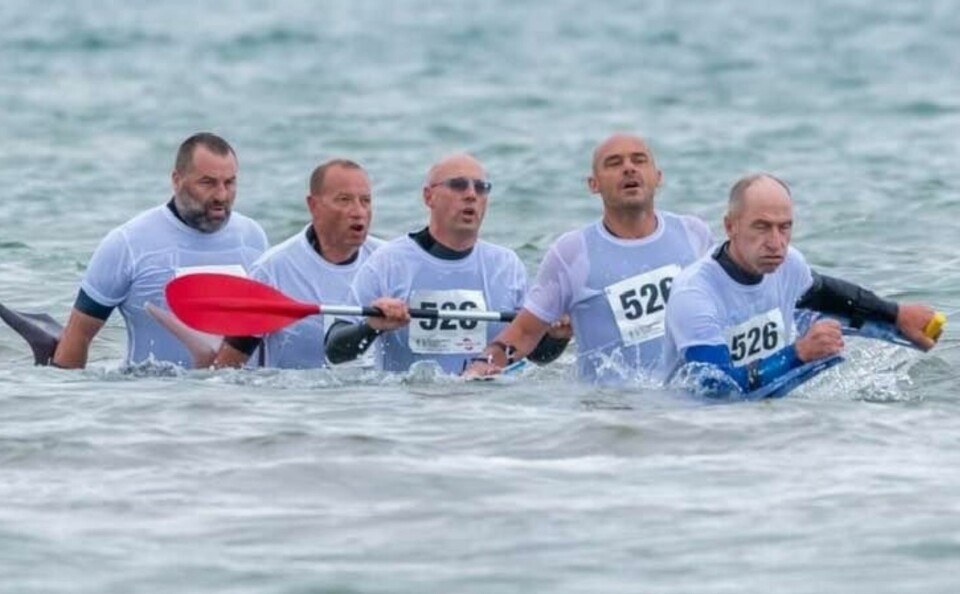-
Rugby vocabulary to know if watching the Six Nations in France
From un tampon to une cathédrale, understand the meaning of key French rugby terms
-
How and when to watch the Six Nations rugby for free on French TV
France will play Ireland in the opening match at the Stade de France on February 5
-
France to host first NFL regular-season game at Stade de France in 2026
The US’s National American Football League has over 14 million fans in France
French sport ‘longe-côte’ or sea wading is growing competitive event
How the simple sea wading activity went from healthy exercise to a recognised sport in France and beyond

Longe-côte, known as ‘sea wading’ in English, has taken French coasts by storm.
Invented in 2005 by Thomas Wallyn, a professional rowing teacher in northern France, it involves walking several hundred metres into the sea with the water up to your chest and was initially meant as a muscular method to train rowers.
But its popularity travelled onto southern coasts as well, where throngs of retirees and younger people found it to be a cheerful activity.
First club in Dunkerque
Within a matter of years the sport had its own federation organising competitive events, the 7th French longe-côte championship having attracted 585 participants.
“The phenomenon is real,” said Mr Wallyn, who named the sport after he went “along the coast” (longe-côte in French) looking for a technique to implement in rowing in Dunkerque (Hauts-de-France).
He was joined by friends and created the first French club there, adding that he did not expect it to become so popular.
Not just people walking in the sea
Longe-côte requires a full wetsuit and is only done on shores with small to moderate tides.
Most sessions last an hour in which people move by bringing water to their sides to create movement. It is open to all ages and genders.
It is roundly praised for its health benefits, since the activity is very gentle on tendons and joints, unlike sports on terra firma. It was also proven – like other water activities – to be good for lymphatic drainage.
“It is driven by a lot of health benefits but it also takes your mind away and helps to reappropriate the sea,” said Mr Wallyn, who refuses to characterise the sport as only “people walking in the sea” but rather “a real sporting activity” that “compares with swimming.”
Read more: Can I ask a foreign GP for a French sports certificate?
Read more: How to join a sports club in France: admin, medical and fees explained
It was only a matter of time before other clubs joined in and popped up.
Longe-côte now has clubs around France, mainly in the north and south.
“I do a one hour-session every day,” said Valérie Pascallon, president of longeTeam06 association in Vallauris (Alpes-Maritimes) and a trained triathlete and keen skier.
Ms Pascallon said she was introduced to the activity by a friend at a nearby club before she created her own club in 2019.
The club expects more than 200 people to join for the next season, with more than 25 already having enrolled by September when we spoke.
Just 30 people in total had enrolled in 2019, another testament to the activity’s growing popularity.
Decathlon now onboard
The number of clubs has motivated Mr Wallyn to unite them under a federation that was eventually included as part of the Fédération française de randonnée (FFR) – France’s hiking federation.
Ms Pascallon is currently training to become a personal coach, as part of a policy by the FFR to better improve the activity.
Companies such as Decathlon have also taken on the trend with videos presenting the activity, while Mr Wallyn has developed – with the help of medical professionals – a patented longe-up, a specially-designed flipper for arms.
Read more: France’s favourite brands: Decathlon, Peugeot and E. Leclerc top poll
LongeTeam06 offers three types of lessons: Leisure, Health and Competition. Because, of course, it was only a matter of time before it explored a competitive element.
Regional and national competitions have mushroomed around the country including 50 metres, 200 metres, 400 metres or one kilometre distances, individual or in pairs.
People aged from 12 to 70 and over are listed among eight categories.
French longe-côte events took part in Leffrinckoucke (Nord, 2015), Erquy (Côtes-d’Armor, 2016), Marignane (Bouches-du-Rhône, 2017), Sables d’Olonne (Pays de la Loire, 2018), Barcarès (Pyrénées-Orientales, 2019) and Hyères (Var, 2021).
Benjamin Farcinade and Romain Leray are two of the best athletes representing France, with both having participated in the first European competition in Spain in September (the sport took off in other European countries such as Spain and Italy and in lakes around Bavaria).
Longe Cote UK, the UK’s first Longe Cote group, is located on Gyllyngvase beach in Falmouth. Other longe-côte clubs have reported to The Connexion of some British citizens looking for clubs in France.
“I now just hope Americans will take on the sport,” said Mr Wallyn.
Related articles
Glow-in-dark boules ball solved night game problem for French inventor
Walking group helps French heart patients live a normal life again
Calling all pickleball fans: help grow the US craze in France
























